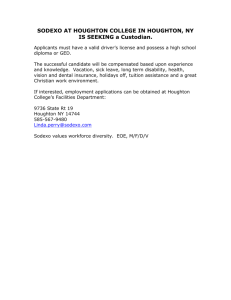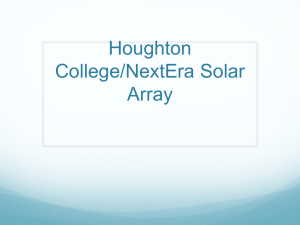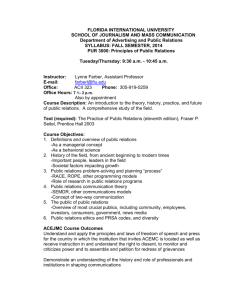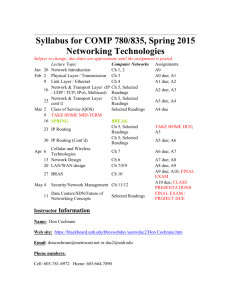ENVS 80B: Ecological Forecast for Global Warming
advertisement
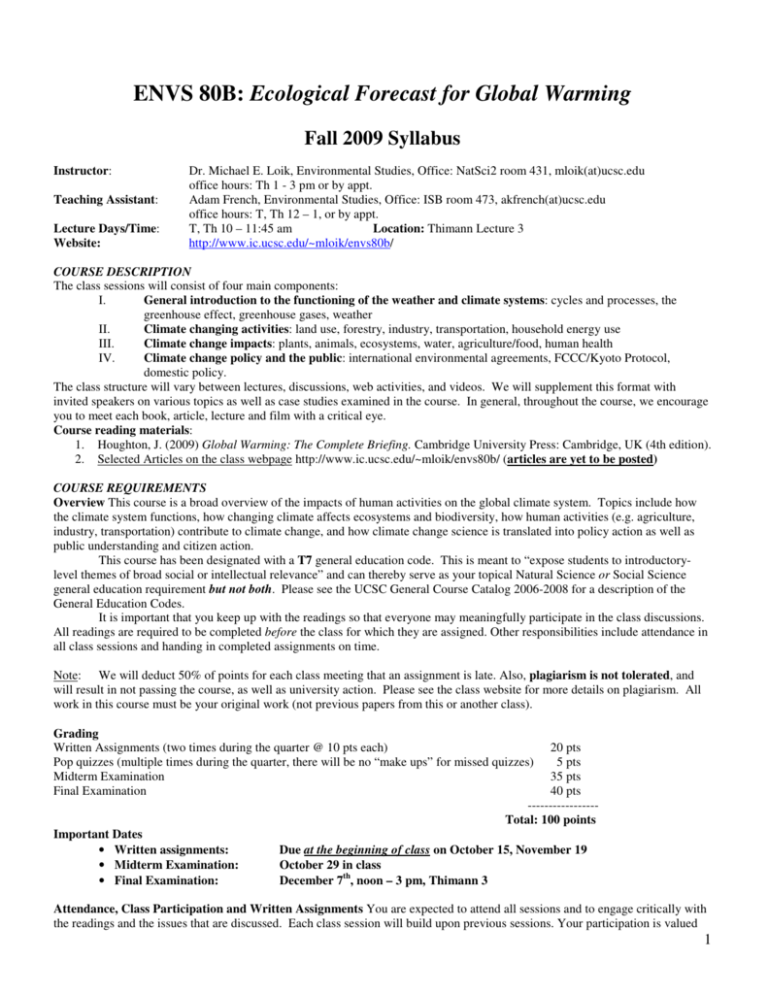
ENVS 80B: Ecological Forecast for Global Warming Fall 2009 Syllabus Instructor: Teaching Assistant: Lecture Days/Time: Website: Dr. Michael E. Loik, Environmental Studies, Office: NatSci2 room 431, mloik(at)ucsc.edu office hours: Th 1 - 3 pm or by appt. Adam French, Environmental Studies, Office: ISB room 473, akfrench(at)ucsc.edu office hours: T, Th 12 – 1, or by appt. T, Th 10 – 11:45 am Location: Thimann Lecture 3 http://www.ic.ucsc.edu/~mloik/envs80b/ COURSE DESCRIPTION The class sessions will consist of four main components: I. General introduction to the functioning of the weather and climate systems: cycles and processes, the greenhouse effect, greenhouse gases, weather II. Climate changing activities: land use, forestry, industry, transportation, household energy use III. Climate change impacts: plants, animals, ecosystems, water, agriculture/food, human health IV. Climate change policy and the public: international environmental agreements, FCCC/Kyoto Protocol, domestic policy. The class structure will vary between lectures, discussions, web activities, and videos. We will supplement this format with invited speakers on various topics as well as case studies examined in the course. In general, throughout the course, we encourage you to meet each book, article, lecture and film with a critical eye. Course reading materials: 1. Houghton, J. (2009) Global Warming: The Complete Briefing. Cambridge University Press: Cambridge, UK (4th edition). 2. Selected Articles on the class webpage http://www.ic.ucsc.edu/~mloik/envs80b/ (articles are yet to be posted) COURSE REQUIREMENTS Overview This course is a broad overview of the impacts of human activities on the global climate system. Topics include how the climate system functions, how changing climate affects ecosystems and biodiversity, how human activities (e.g. agriculture, industry, transportation) contribute to climate change, and how climate change science is translated into policy action as well as public understanding and citizen action. This course has been designated with a T7 general education code. This is meant to “expose students to introductorylevel themes of broad social or intellectual relevance” and can thereby serve as your topical Natural Science or Social Science general education requirement but not both. Please see the UCSC General Course Catalog 2006-2008 for a description of the General Education Codes. It is important that you keep up with the readings so that everyone may meaningfully participate in the class discussions. All readings are required to be completed before the class for which they are assigned. Other responsibilities include attendance in all class sessions and handing in completed assignments on time. Note: We will deduct 50% of points for each class meeting that an assignment is late. Also, plagiarism is not tolerated, and will result in not passing the course, as well as university action. Please see the class website for more details on plagiarism. All work in this course must be your original work (not previous papers from this or another class). Grading Written Assignments (two times during the quarter @ 10 pts each) 20 pts Pop quizzes (multiple times during the quarter, there will be no “make ups” for missed quizzes) 5 pts Midterm Examination 35 pts Final Examination 40 pts ----------------Total: 100 points Important Dates • Written assignments: Due at the beginning of class on October 15, November 19 • Midterm Examination: October 29 in class • Final Examination: December 7th, noon – 3 pm, Thimann 3 Attendance, Class Participation and Written Assignments You are expected to attend all sessions and to engage critically with the readings and the issues that are discussed. Each class session will build upon previous sessions. Your participation is valued 1 and will demonstrate your preparation for the class discussions. An important requirement will be that you come to the class session with the completed assignment. You must bring a hard copy of the assignment to class. Emailed assignments will not be accepted. Your completed responses to these assignments must be typewritten and no more than two double-spaced pages total, using 12 pt Times New Roman with 1” margins. This means that the written assignments must be clearly written and concise. The assignments will be posted to the class website (http://www.ic.ucsc.edu/~mloik/envs80b/) one week before they are due. The assignments will be designed to make you think about the class material and will prepare you for the types of short-answer and written essay questions that you will see on the midterm and final exams. In order to answer these questions, we expect that you will refer to past readings and lectures as well as additional sources. Exams The examinations will be closed-book and no notes will be allowed. Dates and times for the examinations are final, so see the instructor or the TA immediately if you anticipate any kind of conflict or problem. The final exam will be cumulative in the sense that it builds on concepts and foundations discussed in the first portion of the course. The content for these examinations will come from the lectures, as well as the required readings. Unfortunately, in lecture we will not be able to discuss many important and worthwhile facets of the readings so it will be your responsibility to engage both critically and mindfully with these readings outside of the class sessions. To help in this endeavor, you may wish to ask yourselves the following questions: What are the main points or themes in the reading? How is this work similar to or different from other course material, your own ideas, or other information you have come across in the past? Where are possible weaknesses in the author’s arguments? Where could s/he have explained assertions more deeply/clearly? Do you agree with the author’s central assertions, theories, and/or ideas? If so, why? If not, why not? Writing out answers to these questions will only help you as you prepare for the examinations as well as the class discussions. CLASS LECTURE AND READING SCHEDULE Date Topic September 24 September 29 Introduction to the course Climate: Cycles and Patterns October 1 Weather: Processes and Impacts October 6 October 8 October 13 October 15 October 20 October 22 October 27 Greenhouse Gases and the Greenhouse Effect Land-Use and Land-Use Change Jeff Bury: Andean Glaciers & Livelihoods Adam French: The Signs of Climate Change Carbon Cycling Extreme Events Biological Resources October 29 November 3 November 5 November 10 Midterm Examination Freshwater Resources Guest Lecture TBA What is UCSC Doing to Reduce CO2 Emissions? Patrick Testoni: Physical Plant Energy Manager Rising Sea Levels Energy: Carbon-Based Industry & Society Human Health November 12 November 17 November 19 November 24 November 26 December 1 December 3 December 7 International Environmental Agreements and Policy: FCCC/Kyoto Protocol/Copenhagen Holiday - Thanksgiving International Environmental Agreements and Policy: FCCC/Kyoto Protocol/Copenhagen Approaches to a Cleaner Energy Future FINAL EXAM Readings/Assignments (to be completed before class) --Houghton: Chapter 1, Chapter 5 Written Assignment #1 posted to class website Houghton: Chapter 1, Chapter 5 Supplemental readings posted on class website Houghton: Chapters 2 & 3 Reading to be posted to class website Houghton: pp. 187 - 202 Houghton: pp. 172 – 186; 203 - 227 Houghton: pp. 34 - 50 Houghton: pp. 137 - 166 Houghton: pp. 203 - 208; Supplemental readings posted on class website Written Assignment #2 posted to website Readings to be posted on class website Houghton: pp. 172 -186 Houghton: Chapter 9 Houghton: pp. 213 - 227 Written Assignment #2 due in class Houghton: Chapters 9 & 10 --Houghton: Chapters 9 & 10 Houghton: Chapter 11 Noon – 3 pm!; Thimann 3 (same room as lectures) 2
